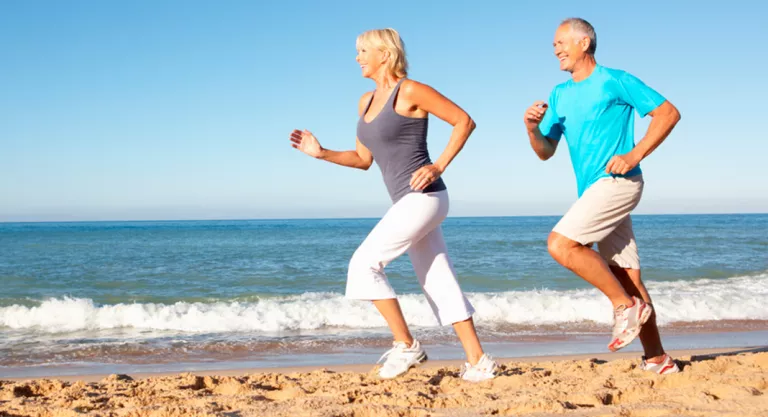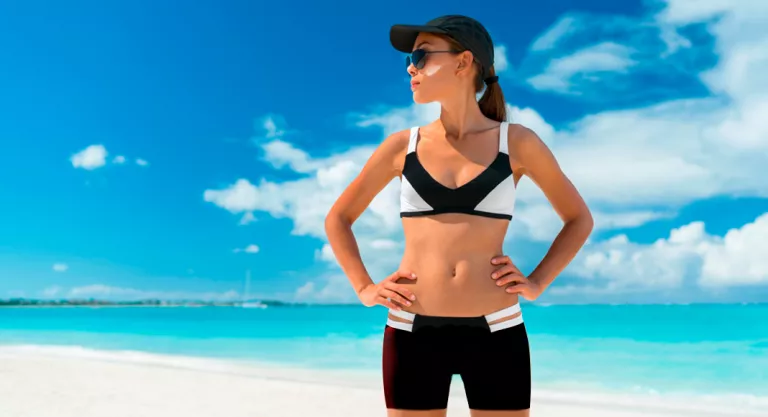Exercising regularly is highly recommended, but when temperatures are very high you have to know when and how to do it to avoid dehydration or heat stroke. Despite this, in summer there are more and more people who sign up for sunning (running in the sun) or running under the sun, especially during their vacations. Devoting part of our free time to practicing physical activity in the open air is, in principle, very healthy, but in this case we must take precautions to take advantage of all its advantages without putting ourselves at risk.
Table of Contents
- Health benefits of sunbathing
- Tips for running in the sun safely
1 . Health benefits of sunbathing
The idea of running under the sun is to do it in contact with nature, so enjoying the surroundings can be considered one of its main advantages. “It is an outdoor sport that is usually practiced in places where the air is purer than in cities due to pollution, such as on the beach, where you run at sea level, where there is greater availability of oxygen and it is more pleasant”, says Dr. José Luis López Estebaranz, president of the Ibero-Latin American College of Dermatology (CILAD) and an expert in medical, surgical and aesthetic dermatology.
“The main benefits of sunning are that you run outdoors, in a healthy environment with magnificent air quality and exposing your skin to the sun, but it is essential to protect yourself from ultraviolet radiation.”
Sunning is a physical exercise that can provide health benefits similar to those of other sports, to which would be added the advantage of doing it in an environment such as the beach. The main advantages of his practice are:
- Eliminate stress. The sea breeze and the sound of the waves work as a natural calmer to relieve tension and help release serotonin (known as the ‘happiness hormone’), thus preventing anxiety and depressive symptoms.
- It strengthens the joints, since the impact on sand is less than on harder surfaces such as asphalt.
- Improves breathing thanks to the quality of the air by the sea, something especially beneficial for people who suffer from allergies, asthma or nasal congestion.
- Facilitates rest. The fresh air, the sun and the sea breeze act as natural relaxants and when night falls it is easier to fall asleep.
- Powers the strengthening of the immune system. “Exposure to nature, where air quality is better, can be beneficial and counteract problems derived from pollution in cities. The best way to guarantee protection against infections of any kind is to promote general health: adequate nutrition, proper rest, mental health care and physical exercise”, says María Sánchez, e-Health Manager of Cigna Healthcare in Spain.

- Promotes balance. The sand on the beach or a path through the countryside are uneven terrain on which balance is trained.
- Contributes to maintaining a proper weight. During the holidays we tend to snack more and treat ourselves to the occasional treat, such as ice cream or soft drinks, so it is essential to spend time exercising.
- It favors the synthesis of vitamin D. Dr. Estebaranz explains that for our body to synthesize the necessary vitamin D it is enough for the sun to shine on one part of the body for 10 minutes a day. However, it indicates that some people no longer produce enough vitamin D despite sunbathing, so if they are deficient they should take a vitamin D supplement once or twice a month, depending on their levels and the recommendation. from your doctor.
2 . Tips for running in the sun safely
“Running under the sun has become fashionable, especially in coastal areas, on the beach, and it’s nice because you run in an environment free of noise and pollution, but with this practice we have an overexposure to the sun that can increase the risk of damage to the skin by ultraviolet B radiation, which predisposes to the appearance of precancerous or cancerous lesions over time, as well as premature aging of the skin and the appearance of spots, such as melasma”, says Dr. Estebaranz. These tips will help you practice sunning safely:
- Pick the right time. The ideal sunning is to do it either first thing in the morning or late in the afternoon, and avoid the hours that go from 11 in the morning to 4 in the afternoon, because that is when the ultraviolet index is most harmful and it is important to avoid the sun. excess ultraviolet radiation.
- Use sunscreen. A sunscreen with high protection should be used –between 30 and 50– because we not only receive ultraviolet radiation directly from the sun, but also that which is reflected on the surface of sea water or sand, and many times we do not experience a sensation of heat due to to the sea breeze that refreshes us and prevents us from realizing that we are burning. To avoid this, there are also technical garments that allow the skin to breathe, but avoid ultraviolet radiation, and that can protect us from the sun even without using photoprotective creams.
- Wear sunglasses that effectively block ultraviolet radiation, as it can cause photokeratitis. “It is mainly caused by the reflection of the sun on the water or on the sand, it would be similar to snow ophthalmia, which occurs when winter sports activities are carried out without the appropriate glasses and the reflection of the sun on the snow causes damage in the cornea”, says Dr. Fernando Llovet, ophthalmologist and co-founder of Clínica Baviera, who recommends that to go to the beach or the mountains, or to be in sunny environments, you should use glasses with lenses that absorb between 82 and 92% of the light and that would correspond to category 3 (the filter number (0,1,2,3,4) indicates the amount of light they absorb and goes from least to greatest).
- Choose the safest ground. If you run on the beach, do it in an area where the sand is compact and the terrain is as level as possible, to avoid injuries such as sprains and strains.

- Protect your head. The use of a cap is convenient because, although the hair can protect from the sun, there are areas of the scalp with less capillary density –for example, where the part is– that you can burn. To prevent hair damage, specific sunscreens are also available.
- Consider the medication. Dr. Estebaranz warns that people who take drugs should take into account that there are photosensitive medications, that is, they cause allergic reactions when exposed to sunlight.
- Hydrate properly. Obviously, an athlete has to hydrate, says the dermatologist, and the same when we run outdoors, because in the case of sunbathing on the beach, the sensation of thirst may be less due to the sea breeze, so you have to go out hydrated and then gradually hydrate, especially if you are going to do a long session of running outdoors, because otherwise you could suffer a heat stroke.
“In short, I believe that sunning is a healthy and fun activity, but that it must be done taking the appropriate protection measures that allow us to enjoy it without putting our skin at risk. That is why photoprotection is important and some photoprotective creams also contain antioxidants, which protect above all against UVA rays. It is also convenient to hydrate the skin after showering”, concludes the dermatology specialist.














